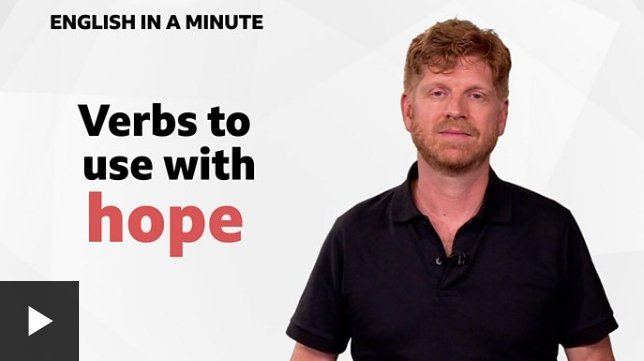Introduction
Hope is the feeling of wanting and expecting something to happen. There are some words that we often use together. These are called collocations. Learn some of the verbs that we often use with the noun ‘hope’ with Neil in this video.
Common collocations with ‘hope’
be full of hope
If you are full of hope, you really want something to happen and believe that it will.
- I haven’t found the right person for me yet, but I’m full of hope. I’ve got five dates this week!
express hope
When you express hope, you show or say to other people the thing you want to happen.
- My colleague has expressed hope in getting the promotion. I have my fingers crossed for her.
bring someone hope/give someone hope
To bring or give someone hope means you encourage and share the hope of someone else.
- You should tell him how well he did in the mock exam. It’ll give him hope for the real thing.
live in hope
If you live in hope, you hope for something to happen, even if you know it’s unlikely to happen.
- I haven’t become a famous singer yet, but I live in hope!
TRANSCRIPT
Note: This is not a word-for-word transcript.
Neil
We‘re full of hope that you’ll learn verbs that go with ‘hope’ in this lesson.
If you are full of hope, you really want something to happen or believe that it will.
Zoe didn’t know if the interview had gone well or not, but she was full of hope.
If you express hope, it means you tell somebody the thing you want to happen.
Zoe expressed hope to her mum that she would get the job.
You can bring somebody hope or give someone hope. That means you encourage and share the hope of the person you’re with.
Zoe’s mum gave her hope. “You’re brilliant, no matter what the outcome”, she said.
If you live in hope, you hope for something, even if you know it probably won’t happen.
Zoe didn’t get the job, but she lives in hope.
I hope I‘ve brought you some hope for your English today!
